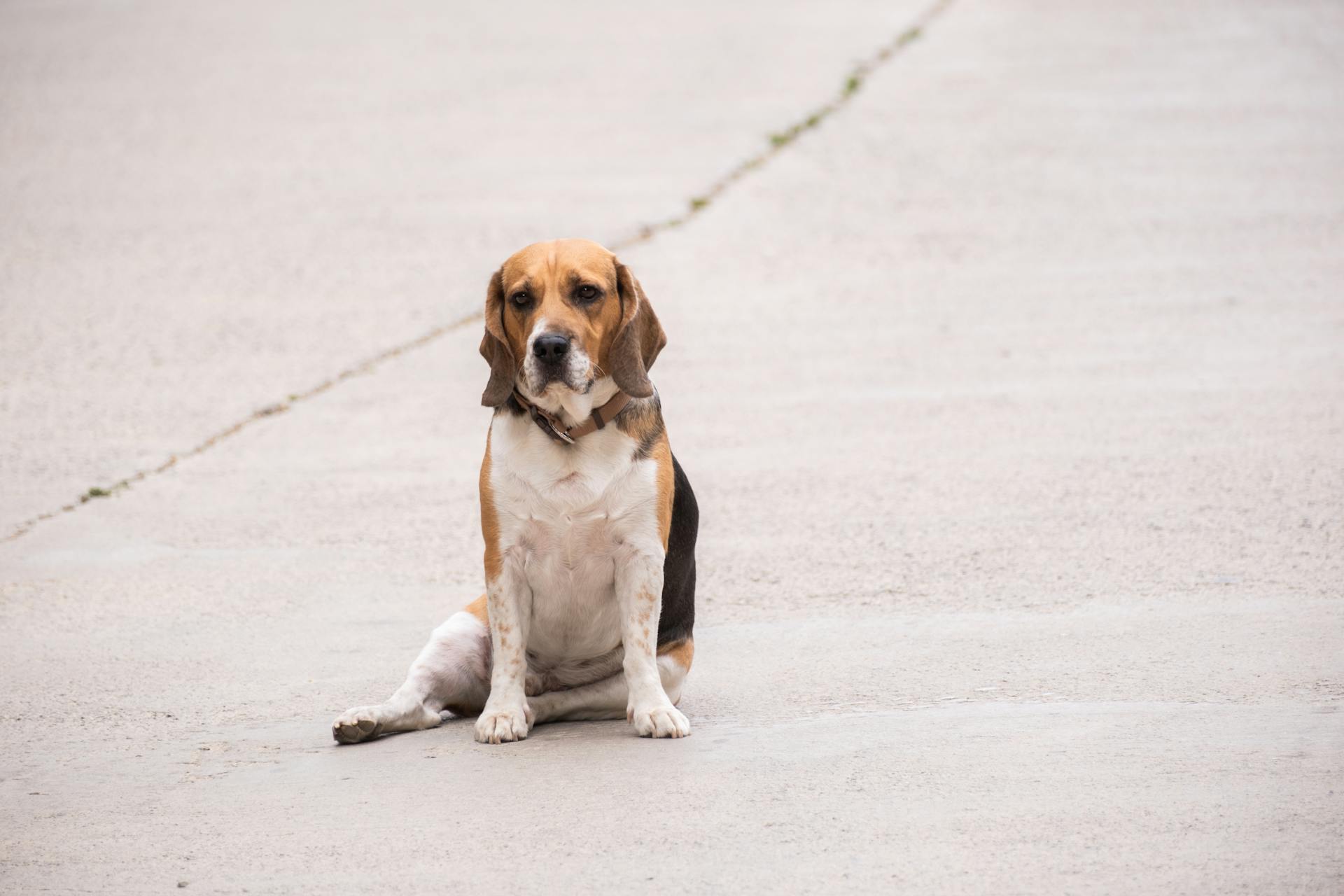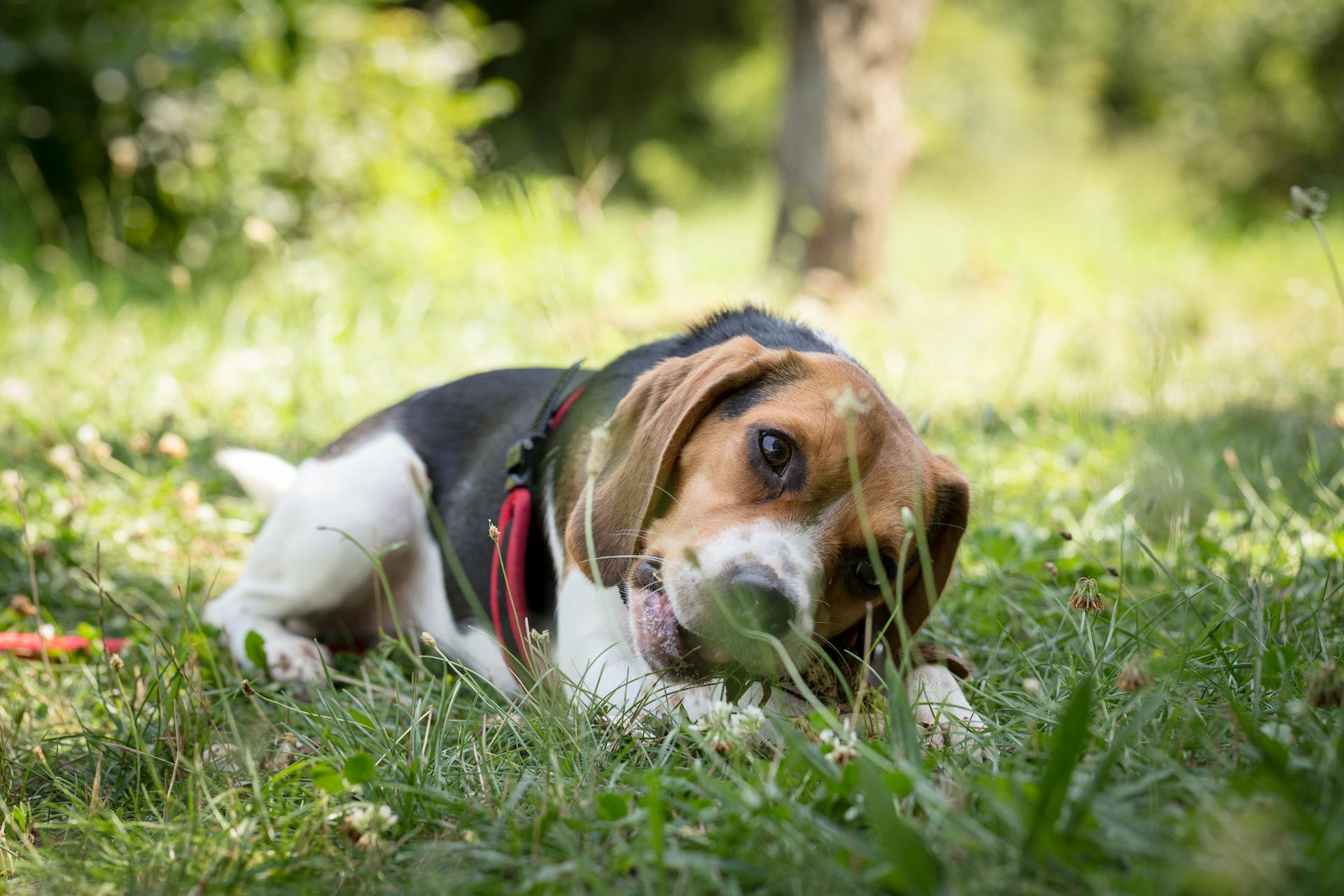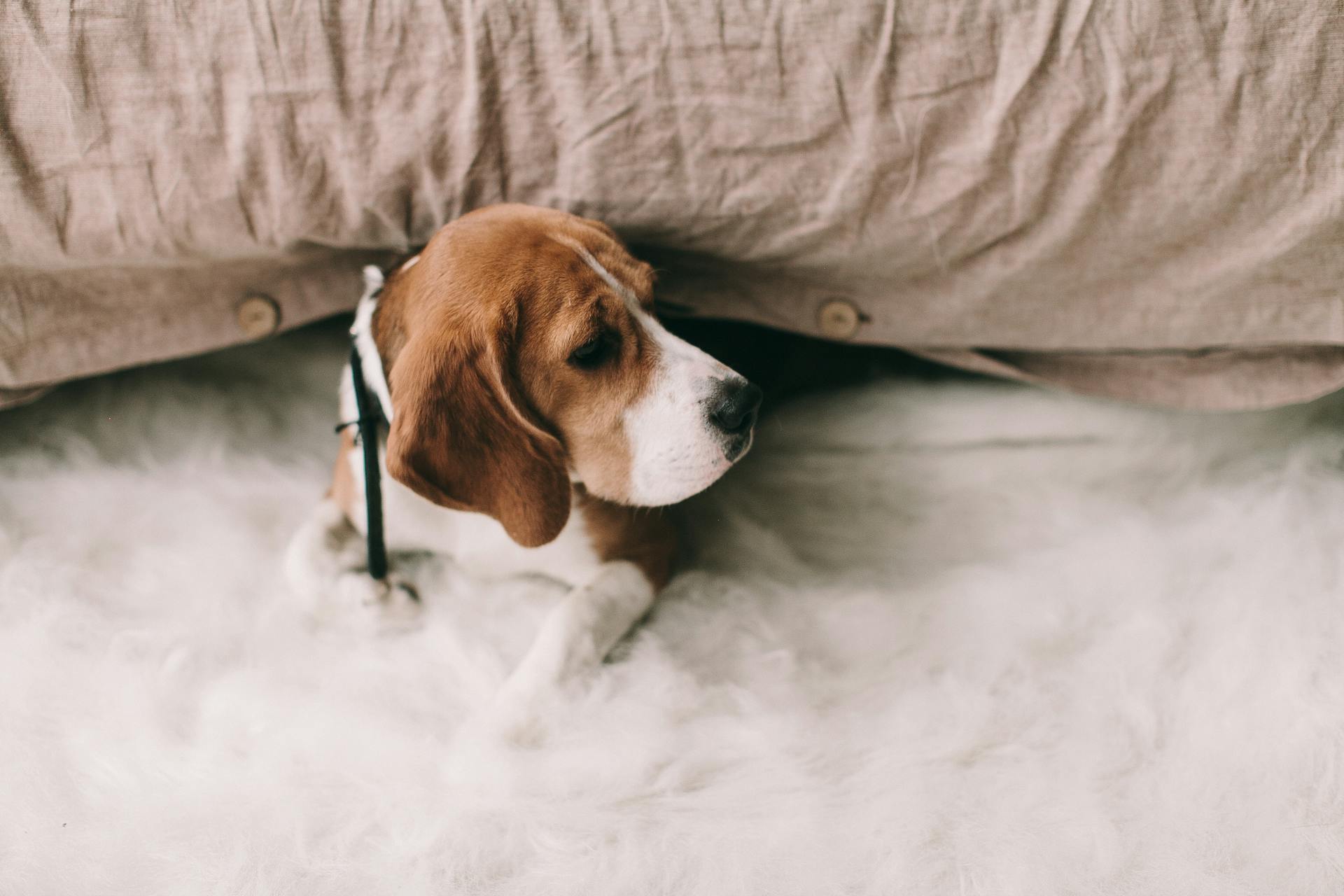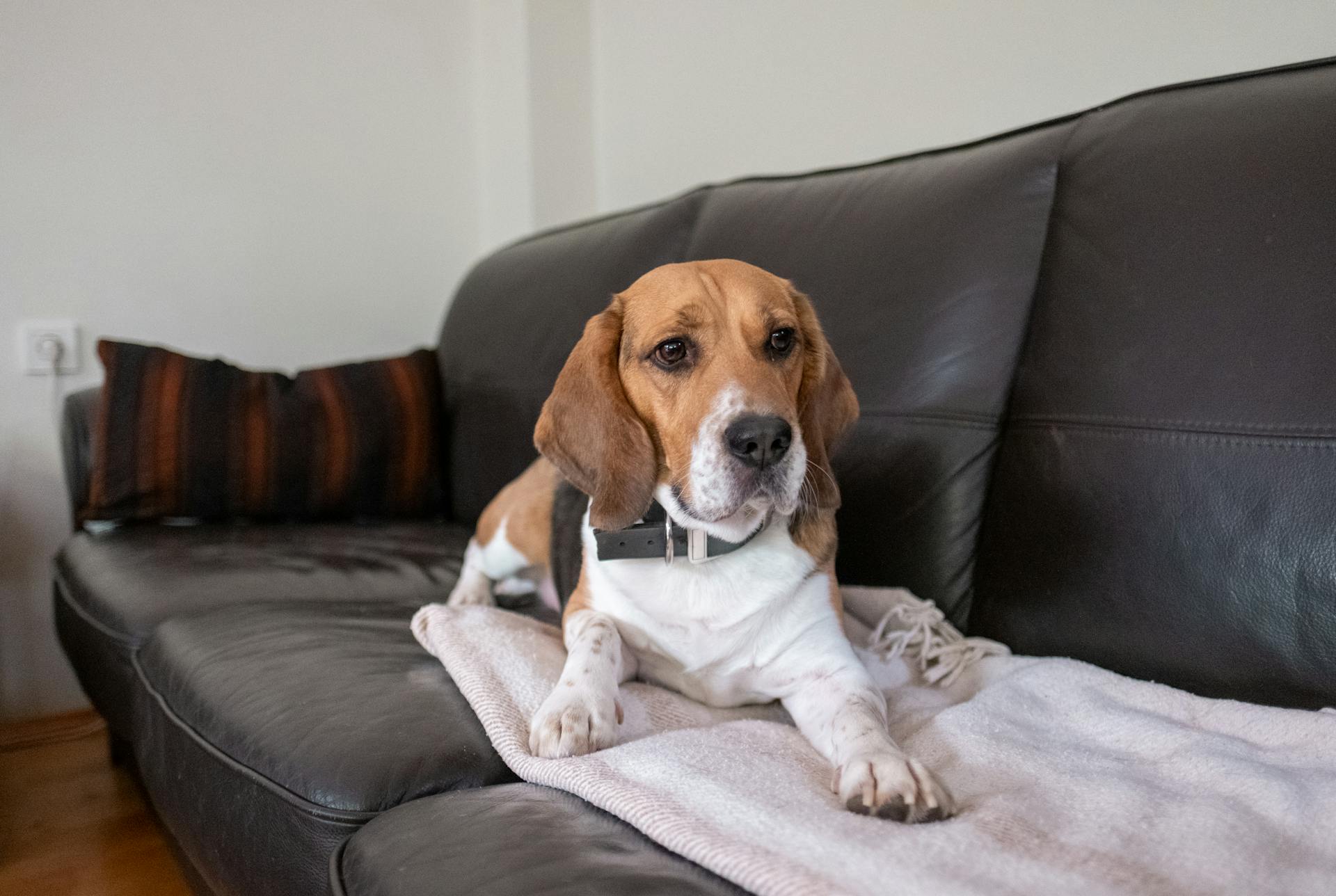
Beagles are natural-born hunters, bred to track and follow scents. Their keen sense of smell and energetic nature make them perfect for hunting small game.
To get the most out of your beagle's hunting abilities, it's essential to understand their behavior and body language. Beagles are pack animals and thrive on interaction with their human family, so involving them in the hunting process can strengthen your bond and create lasting memories.
A beagle's sense of smell is incredibly powerful, with some studies suggesting they can detect scents that are 10,000 times weaker than what humans can detect. This makes them perfect for tracking and locating game.
By understanding and working with your beagle's natural instincts, you can create a successful and enjoyable hunting experience for both you and your furry companion.
Related reading: Dog Scent Receptors
What Makes the Beagle Stand Out?
The Beagle's keen sense of smell is one of its standout features, with nearly 225 million olfactory receptors. This allows them to track small game with ease.
Beagles are also known for their distinctive barking, which can be heard deep in the woods and is a clear indication that they've found something. Their loud barks are music to the ears of hunters.
Their perseverance and determination make them ideal companions in the field, especially during difficult climatic conditions. They're courageous and persistent, never giving up the hunt.
Beagles have great stamina and boundless energy, making them invaluable when hunting small game. They can keep going for hours, never tiring.
These qualities make the Beagle a top choice for small game hunting. They're always on the lookout for potential danger, and their alertness is crucial in avoiding confusion with game by other hunters in the field.
Here are some key characteristics that make the Beagle stand out:
- Keen sense of smell: nearly 225 million olfactory receptors
- Distinctive barking: a clear indication of finding small game
- Perseverance and determination: courageous and persistent in the field
- Great stamina: can hunt for hours without tiring
- Always on the lookout: alert and attentive to potential danger
Choosing a Beagle
If you're considering bringing a Beagle into your family, you'll want to know what makes them such great hunting companions. Beagles have been used for centuries as hunting dogs, and their popularity endures to this day.
Their keen sense of smell is one of their most impressive traits, with nearly 225 million olfactory receptors. This means they can sniff out small game with ease.
Beagles are also known for their loud barking, which is music to the ears of hunters when they've found something. These distinctive barks can even be heard deep in the woods.
One of the reasons Beagles make such great hunting partners is their perseverance and determination. They're courageous, persistent, and won't give up, even in difficult conditions.
Their great stamina and boundless energy are also invaluable when hunting small game. They can keep going for hours, making them a valuable asset in the field.
As a Beagle owner, you'll want to make sure they're always on the lookout for potential danger, such as larger animals, and avoid being confused with game by other hunters. To ensure this, you'll want to train them to be alert and attentive at all times.
Broaden your view: Great Pyrenees Hunting Dog
Rabbit Hunting Techniques
Rabbit hunting with beagles is an exhilarating experience, and to ensure a successful outing, it's essential to employ effective strategies. A pack of 2-5 dogs is recommended for optimal results, as it allows for a wider coverage area, increasing the chances of locating the rabbit.
Beagles have a remarkable knack for tracking rabbits and other small animals, thanks to their exceptional scenting abilities and natural tracking skills. Their small size allows them to navigate through thick brush and rough terrain effortlessly, enhancing their endurance during hunts.
To maximize your shooting opportunities, keep your beagles close by during the hunt, preferably within 50 yards. This allows the hounds to quickly pick up the scent and continue the pursuit if you happen to lose sight of the rabbit.
Hunting in packs is a key technique used by beagles, leveraging their collective strength and coordination to track and corner prey. Their keen sense of smell and tracking abilities allow them to cover large areas, increasing their chances of locating their target.
A unique perspective: Beagle Rabbit Hunting Dogs
The ability to guide and control the beagles during a hunt is vital for a successful outcome. Correct positioning and communication between hunters and beagles is also crucial, ensuring their safety and effectiveness.
Beagles are most effective when hunting in packs, and their hunting techniques include flushing out prey, tracking scents, and using their keen sense of smell to locate prey. By understanding these techniques, you can gain insights into their remarkable hunting abilities and why they remain a favorite among hunters.
Here are some key characteristics of beagles as hunting dogs:
- Remarkable scenting abilities
- Effective in locating and pursuing rabbits
- Small size for easy navigation through thick brush and rough terrain
- Endurance during hunts
Training and Health
As you start training your Beagle for hunting, it's essential to be aware of the potential health risks associated with their energetic lifestyle. Beagles are prone to spinal injuries and intervertebral disc disease.
Regular veterinary check-ups are crucial for early detection of intervertebral disc disease (IVDD), which can lead to severe pain, nerve damage, and even paralysis. Monitor your Beagle for any signs of back pain or difficulty with movement.
Keep a close eye on your Beagle's physical demands during hunting activities, and stay alert to any signs of discomfort or injury, such as difficulty moving, apparent discomfort, or changes in posture.
For another approach, see: Signs of Prey Drive in Dogs
Training Your Beagle
Training your Beagle requires a thoughtful approach, especially when it comes to managing their selective hearing when they catch a scent.
Beagles are naturally skilled in scent tracking, which is a key aspect of their hunting ability. They possess a high level of energy suited for the hunt, but this also means they need plenty of exercise to keep them happy and healthy.
To ensure your Beagle gets enough exercise, aim for at least 30 minutes of physical activity per day, such as a brisk walk or playtime in the yard. This will help burn off excess energy and keep them mentally stimulated.
Beagles are social animals and need regular socialization to prevent behavioral problems. This can be achieved by introducing them to new people, places, and experiences from an early age.
Training a Beagle for hunting is an exciting journey that taps into their natural instincts and abilities, but it does come with its own set of challenges.
You might enjoy: How Long Can a Dog Smell Another Dogs Scent
Health Considerations

Beagles are robust dogs, but certain health factors must be considered when they're active in hunting roles. They're prone to spinal injuries and intervertebral disc disease.
Regular veterinary check-ups are crucial for early detection of intervertebral disc disease. This condition can lead to severe pain, nerve damage, and even paralysis.
Beagles with intervertebral disc disease may exhibit difficulty moving, apparent discomfort, or changes in posture. These symptoms can indicate the onset of IVDD.
Early diagnosis of IVDD can facilitate timely treatment, potentially preventing more severe outcomes.
For your interest: Beagles Good Guard Dogs
Beagle History and Development
The Beagle's history as a hunting dog is a long and storied one, dating back to ancient times. Beagles have been used for hunting since 400 BC in Greece and 200 AD in ancient Britain, where they hunted hare.
Their ancestors, the North Country Beagle and Southern Hound, were bred for hunting hare and rabbit, laying the groundwork for the Beagle's hunting legacy. These early dogs were the precursors to the Beagles we know today.
The modern Beagle breed was developed in the 19th century through careful breeding, including the Talbot Hound, North Country Beagle, and Southern Hound, among others. This careful breeding helped refine the breed and establish it as a skilled hunting dog.
Their friendly demeanor quickly gained them popularity, first in the UK and later in the US. Today, Beagles are not only cherished as skilled hunting dogs but also as beloved family pets.
Suggestion: Scent Hound
Hunting with Beagles
Beagles have a unique instinct that makes them perfect for hunting rabbits - they'll circle back to the spot where they initially hopped out, giving hunters a second chance at a shot.
The thrill of the hunt is a big part of the appeal of beagling, and the baying of the dogs is music to a hunter's ears.
A pack of beagles is the ideal setup for hunting, as it allows them to cover more ground and improve their chances of catching prey. Peeler, an experienced hunter, prefers to hunt with at least three beagles, and considers four to be the optimum number.
Some beagles are better suited for certain types of hunting, with some being good jump dogs and others being better chase dogs.
See what others are reading: Irish Setter Elk Hunter Boots
Effective Hunters
Beagles are top-tier hunting dogs, known for their exceptional scenting abilities and natural tracking skills. Their remarkable knack for tracking rabbits and other small animals makes them a popular breed among hunters.
Historically bred for hunting small game, Beagles excel in locating and pursuing rabbits. Their collective scenting abilities become even more potent when hunting as a pack.
Beagles' small size allows them to navigate through thick brush and rough terrain effortlessly, enhancing their endurance during hunts. This is especially useful in dense forests or rugged terrain.
Some key characteristics of Beagles as hunting dogs include:
- Remarkable scenting abilities
- Effective in locating and pursuing rabbits
- Small size for easy navigation through thick brush and rough terrain
- Endurance during hunts
Hunting in packs allows Beagles to cover more ground and corner prey more efficiently, making them a popular breed among hunters.
Hunt with Different Traits
Beagles have different characteristics that make them effective hunting dogs. Some are good jump dogs, getting in there and really working the tracks and getting the rabbits moving.
You want both kinds in your dog pack, and you have a better chance of that if you hunt with several dogs. This is because different dogs excel in different areas, such as jumping or chasing.
Some beagles are better chase dogs, getting on the trail once the rabbit's moving and keeping after him. These dogs are essential for a successful hunt, as they can track the rabbit and keep it on the run.
A good swamp rabbit dog is a rare treat, but it's worth the effort. These dogs will work five times as hard as a dog chasing cottontails alone, making them a valuable addition to your pack.
To find a good swamp rabbit dog, look for one with a Labrador retriever's affinity for cold water and a persistent, well-trained, keen-nosed, and physically conditioned build.
Here are some key characteristics to look for in a hunting beagle:
- Good jump dog: excels at getting in there and working the tracks
- Good chase dog: excels at getting on the trail and keeping after the rabbit
- Swamp rabbit dog: excels at working in cold water and navigating dense terrain
Prey and Hunting
Beagles are natural-born hunters, excelling in versatility and tracking various types of game. Their keen sense of smell is crucial for following scent trails.
Their relentless determination ensures they persist until the hunt is successful, making them invaluable partners for hunters. Beagles can navigate challenging terrains with ease, whether it's dense underbrush or rugged landscapes.
Agility and intelligence also play key roles in a Beagle's hunting prowess. Their small stature belies a tenacious spirit, allowing them to track and trail with unparalleled dedication.
Beagle Care and Management
Beagles are prone to eye problems, so regular check-ups with a veterinarian are crucial to catch any issues early.
Their short coats require minimal grooming, but they do need regular nail trimming to prevent overgrowth.
Beagles are energetic dogs that need daily exercise to stay happy and healthy.
A 30-minute walk or playtime in the yard is a great way to get your beagle moving.
Beagles are social dogs that thrive on interaction with their family, so spend quality time with them every day.
They love to play fetch and go on adventures, so be prepared to join in on the fun.
Beagles are relatively small, but they still need a comfortable place to sleep, so provide a cozy bed.
A crate can help with housetraining and give your beagle a sense of security when you're not home.
Beagles are intelligent dogs that respond well to positive reinforcement training, so be patient and consistent.
They can be stubborn at times, but with the right approach, they'll learn to obey commands and behave well.
Beagles are generally good with children, but as with any breed, supervise interactions and teach kids how to handle them gently.
Frequently Asked Questions
How much are Beagle hunting dogs?
Beagles are generally more affordable than other hunting breeds, with prices ranging from $250 to $500 for a quality hunting-bred pup. If you're interested in learning more about the cost of owning a Beagle, read on to discover the benefits of this affordable hunting companion.
Sources
- https://www.dogster.com/dog-breeds/how-and-what-do-beagles-hunt
- https://www.stonecreekhounds.com/post/unleash-the-hound-mastering-rabbit-hunting-with-beagles
- https://1source.basspro.com/news-tips/small-game/7221/rabbits-beagles-tips-expert-hunter
- https://omgbeagle.com/are-beagles-good-hunting-dogs/
- https://www.dogster.com/dog-training/how-to-train-a-beagle-to-hunt
Featured Images: pexels.com


